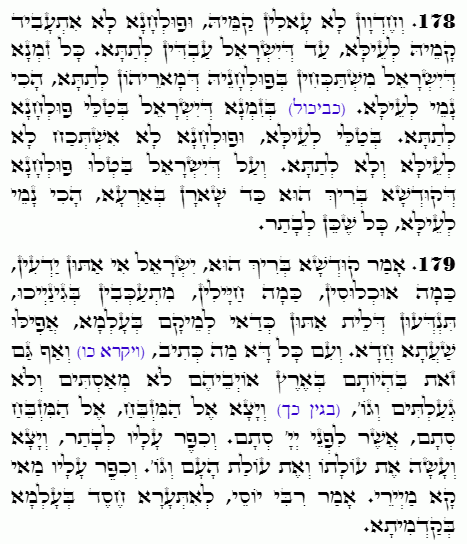Daily Zohar # 4630 – Acharei Mot – I will not cast them away, nor shall I abhor them
Daily Zohar 4630

Hebrew translation:
179. אָמַר הַקָּדוֹשׁ בָּרוּךְ הוּא: יִשְׂרָאֵל, אִם אַתֶּם יוֹדְעִים כַּמָּה אוּכְלוּסִים וְכַמָּה חֲיָלוֹת מִתְעַכְּבִים בִּשְׁבִילְכֶם, תֵּדְעוּ שֶׁאֵינְכֶם כְּדָאִים לַעֲמֹד בָּעוֹלָם אֲפִלּוּ שָׁעָה אַחַת, וְעַל כָּל זֶה מַה כָּתוּב? (ויקרא כו) וְאַף גַּם זֹאת בִּהְיוֹתָם בְּאֶרֶץ אֹיְבֵיהֶם לֹא מְאַסְתִּים וְגוֹ’. (מִשּׁוּם כָּךְ) וְיָצָא אֶל הַמִּזְבֵּחַ, אֶל הַמִּזְבֵּחַ סְתָם, אֲשֶׁר לִפְנֵי ה’ סְתָם. וְכִפֶּר עָלָיו אַחַר כָּךְ, וְיָצָא וְעָשָׂה אֶת עֹלָתוֹ וְאֶת עֹלַת הָעָם וְגוֹ’. וְכִפֶּר עָלָיו, מַה זֶּה אוֹמֵר? אָמַר רַבִּי יוֹסֵי, לְהָעִיר חֶסֶד בָּעוֹלָם בַּתְּחִלָּה.
.
Zohar Acharei Mot
Continued from previous DZ
#178
And joy does not enter before Him, and the service is not performed before Him above until Israel performs it below. As long as Israel is engaged in the service of their Master below, so it is above. But when Israel ceases the service below, it is also ceased above, and there is no service found, neither above nor below. And because Israel ceased the service of the Holy One, blessed be He, when they were dwelling in the land, so it was above, and even more so afterward, in exile.
#179
The Holy One, blessed be He, said: “Israel if you knew how many battalions and how many hosts are delayed in their service above because of you, you would know that you are not worthy of being in the world even for a single hour. And yet, what is written?
Leviticus 26:44
“וְאַף גַּם זֹאת בִּהְיוֹתָם בְּאֶרֶץ אֹיְבֵיהֶם לֹא מְאַסְתִּים וְלֹא גְעַלְתִּים לְכַלֹּתָם לְהָפֵר בְּרִיתִי אִתָּם כִּי אֲנִי יְהוָה אֱלֹהֵיהֶם.”
“Yet for all that, when they are in the land of their enemies, I will not cast them away, nor shall I abhor them, to utterly destroy them and break My covenant with them; for I am YHVH their God.”
Therefore, it is written, ‘And he shall go out to the altar’ (See #176 above), which does not necessarily mean the altar below in the Temple. Similarly, ‘which is before the Lord’ is also stated, not necessarily referring to the Holy Temple. Rather, ‘the altar’ alludes to the altar above, which is the attribute of Malchut, and ‘before YHVH’ refers to Zeir Anpin. And afterward, it is written,
Leviticus 16:24
“וְרָחַץ אֶת בְּשָׂרוֹ בַמַּיִם בְּמָקוֹם קָדוֹשׁ וְלָבַשׁ אֶת בְּגָדָיו וְיָצָא וְעָשָׂה אֶת עֹלָתוֹ וְאֶת עֹלַת הָעָם וְכִפֶּר בַּעֲדוֹ וּבְעַד הָעָם.”
‘and he shall atone upon it, and he shall go out and offer his burnt offering and the burnt offering of the people, etc.'”
He asks: If this refers to Malchut, what does ‘and he shall atone upon it’ mean? Does atonement belong to the higher realms? Rabbi Yossi replied: ‘And he shall atone upon it,’ which means to arouse the attribute of Chessed in the world initially.
Notes:
This section reflects Israel’s actions’ profound spiritual impact on the upper levels. It reveals that numerous forces above are intricately connected to Israel’s spiritual practices. When Israel fails in their service, these forces are hindered in their own tasks, signifying the vital role Israel plays in the world’s order.
Despite Israel’s shortcomings, Hashem expresses His enduring commitment to them, even in their exile, as noted in the verse from Leviticus 26:44. The symbolic reference to the altar highlights this unconditional commitment. While the verse might refer to the physical altar in the Temple, the Zohar explains that it alludes to the spiritual altar above, representing the attributes of Malchut and Zeir Anpin.
Rabbi Yossi explains that “atoning” in this context means invoking Chassadim within the world. This shows that even in the higher spiritual realms, there is a need to stir and channel supernal attributes to maintain balance and bring blessings to the lower worlds. Israel is responsible for maintaining the world balance through its actions and service to Hashem.
{||}

 Previous: Acharei Mot
Previous: Acharei Mot

